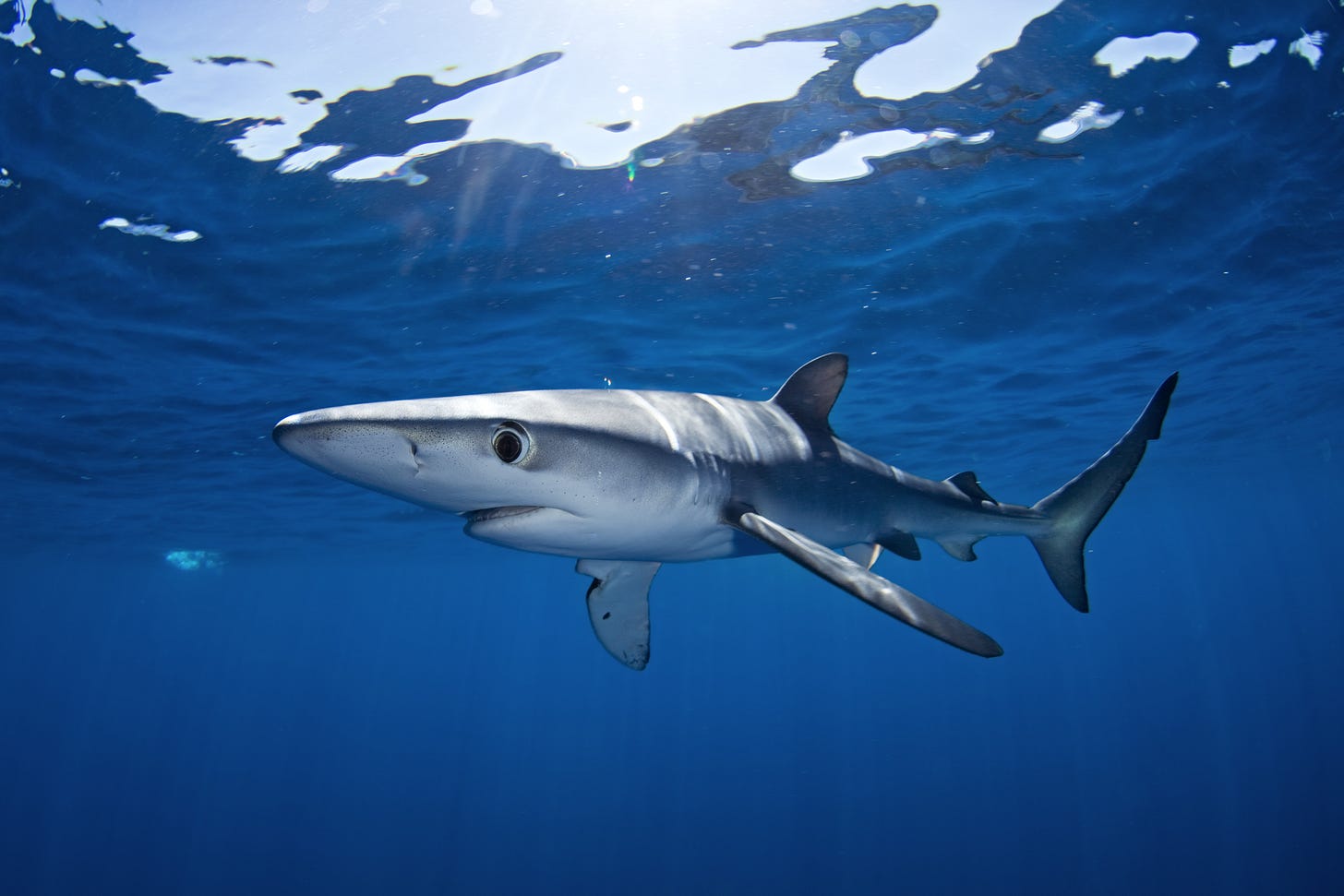On April 17, 2025, Brazil officially legalized the targeted fishing of blue sharks through Portaria Interministerial Nº 30, turning them from incidental bycatch into a commercial species.
The decision, issued jointly by the Ministry of Fisheries and Aquaculture (MPA) and the Ministry of the Environment (MMA), regulates an existing quota—3,481 tons annually—for targeted blue shark fishing across the national fleet.
This moment should mark a red alert. Instead, it’s being painted as a “sustainable step forward.”
Let’s be clear: it isn’t.
Scroll down to read the full story.
Turning bycatch into business
This is not just “formalizing” what’s already happening.
Blue sharks (Prionace glauca) are already heavily caught in Brazil’s longline fisheries—especially in the South and Southeast Atlantic—but until now, they were considered bycatch: collateral victims of a fishing industry targeting other species like tuna or swordfish.
Now, they’re the target.
The government claims this will “improve traceability,” “reduce waste,” and “promote sustainability.” But there’s a dangerous flaw in this framing: formalizing overexploitation does not equal conservation. (Like, really, how?!)
In fact, it sends a message that if an animal is already dying in large numbers due to poor oversight, the solution is to legalize it—then profit from it.
That’s not a solution. That’s institutionalizing collapse.
What the science (and reality) says
Blue sharks are not fine—and Brazil knows it.
They are the most commonly caught shark species in the world, and their numbers are plummeting. While they’re currently classified as Near Threatened by the IUCN, global declines are accelerating—particularly in the South Atlantic.
Sea Shepherd Brazil has been unequivocal in its opposition, calling the new law a “Portaria of extinction.” In their detailed statement of repudiation, they outline that:
No reliable population data justifies this quota
No independent monitoring system exists to enforce it
No scientific consensus was consulted or cited
And no precautionary principle was applied—despite Brazil having committed to one under international environmental agreements
If there’s no way to assess how many sharks are left, how can we decide how many we can kill? 🤨
A dangerous precedent: Other countries fish more, so what?
One of the government’s justifications is that Brazil’s quota (3,481 tons/year) is smaller than the blue shark catch in regions like the North Atlantic, where countries like Spain and Portugal bring in higher volumes.
But this isn’t a race to the bottom.
The fact that other nations are exploiting blue sharks even more aggressively doesn’t make Brazil’s move acceptable. If anything, it highlights a growing global crisis: instead of curbing exploitation, we’re spreading it.
Brazil had the chance to lead by example and protect a keystone pelagic predator in its waters.
Instead, it chose profit over precaution.
Why This Matters
It's not "just one species." It's a symbol of our broken relationship with the ocean.
Sharks are apex predators—crucial to the health and balance of the ocean’s ecosystems. And blue sharks, with their deep-sea range and long migratory routes, are especially vulnerable to overfishing.
Allowing their industrial capture under the guise of “management” sets a terrifying standard.
It's not just about quotas. It's about values.
Are we managing life in the ocean—or managing its extinction?
What Portaria 30 represents, and why it must be stopped
This is a decision made without transparency, without data, and without the voice of the Brazilian public.
It benefits no one except the industrial fishing sector, who will now have full control to direct their fishing towards sharks, benefit from their fins for export—and stimulate even further the commercialization of sharks in the country, without Brazilians even knowing they’re eating sharks.
Meanwhile, Brazil’s image as a steward of marine biodiversity erodes even further.
Blue sharks are now legal targets.
But it doesn’t have to stay that way.
What you can do
⚠️ If you’re a Brazilian citizen, sign Sea Shepherd Brazil’s petition.
🦈 Share this Sea Story. Awareness is the first weapon. Either you are a Brazilian citizen or not, make sure the world knows this is a global danger.
🦈 Tell the Brazilian government you oppose Portaria 30. Support petitions and actions by organizations like Sea Shepherd Brazil.
🦈 Refuse shark products at home and when traveling—especially in restaurants or markets that sell shark fin soup or fillets.
🦈 Demand traceability. Ask where the seafood you see comes from and what species it includes.
Because if we don’t draw a line here… what comes next?
Swordfish farms? Tuna hatcheries? Deep-sea mining zones disguised as innovation? (oh, wait…). This isn’t just about Brazil. This is about what we allow, what we normalize, and who speaks for the ocean.
Blue sharks belong in the ocean.
Not on fishing vessels. Not on our plates. Not in extinction records.
Stay loud, stay informed, stay active.








